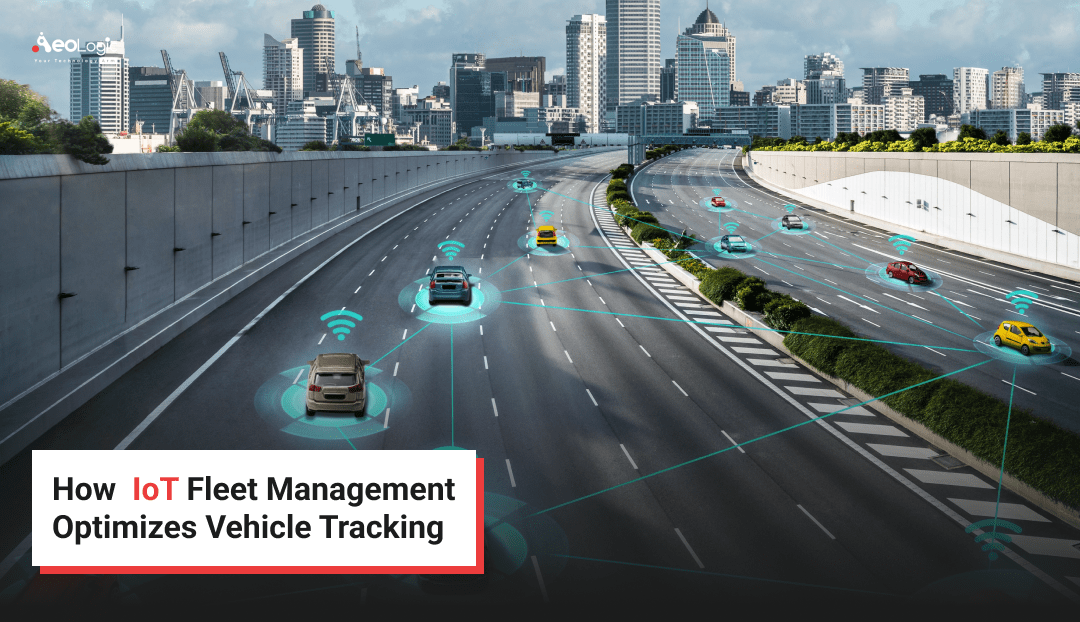Every industry, like logistics, manufacturing, pharmaceuticals, and automobiles needs to deliver or transfer products, resources from one place to another. There could be a group of vehicles that generally refers to fleets that are involved in transfer or delivery for businesses. This is very important to manage the fleet to enable secure, fast, and efficient delivery of products. The fleet management market size has grown rapidly in recent years. It will grow from $20.87 billion in 2024 to $23.99 billion in 2025 at a compound annual growth rate (CAGR) of 14.9%. The fleet management market size is expected to see rapid growth in the next few years. It will grow to $41.11 billion in 2029 at a compound annual growth rate (CAGR) of 14.4%.
Vehicle tracking optimization becomes important while managing a fleet for businesses as it needs to implement a specific tool or solution to enhance the tracking of vehicles. What could be better than IoT when it comes to tracking and monitoring IoT is offering an IoT-powered fleet management system for better optimization of vehicle tracking. IoT (Internet of Things) fleet management for vehicle tracking provides real-time data insights for efficiency, safety, and optimization while monitoring and managing fleets using networked devices and technologies.
Through sophisticated telematics solutions that give access to near-real-time data and analytics, the IoT solutions used in fleet management systems can help to increase visibility, manageability, and savings in both passenger-load and cargo vehicles.
Related Statistics
IoT individually has a great global impact as the Internet of Things market is expected to witness a significant surge in revenue, reaching a staggering US$1.06tn by 2025 worldwide. Looking ahead, the market is anticipated to grow at an annual growth rate of 10.17% (CAGR 2025-2029), resulting in a remarkable market volume of US$1.56tn by 2029. The global IoT fleet management system market is projected to reach $9.24 billion in 2025, growing from $7.96 billion in 2024, at a compound annual growth rate (CAGR) of 16.1%. It is projected to reach US$37.7 billion by 2030, growing at a CAGR of 19.1% from 2023 to 2030.
What is IoT Fleet Management for Vehicle Tracking
IoT fleet management for optimizing vehicle tracking generally refers to using GPS trackers, sensors, and telematics systems to collect and transmit data from vehicles, allowing for real-time tracking and monitoring. The IoT-powered fleet management system can have various use cases for better optimization of vehicle tracking like tracking vehicle locations in real-time, optimizing routes and delivery schedules, monitoring driver behavior, predicting maintenance needs, improving fuel efficiency, enhancing safety and security, etc. There are other benefits and use cases that we will see later in the upcoming paragraph in detail.
Also Read: The Importance of Fleet Management Systems in Logistics
Top Benefits of IoT Fleet Management For Optimizing Vehicle Tracking
There are various benefits of IoT fleet management for optimizing vehicle tracking. Here are a few mentioned below.
Reduces Fuel Consumption
Without any specific tracking and monitoring tool for vehicles during fleet management, there could be unnecessary consumption of fuel that results in loss for businesses. With the IoT fleet management system for optimizing vehicle tracking, it is possible to track the best possible routes that reduce unnecessary fuel consumption.
Also Read: Cold Chain IoT Solutions – Redefining Last-Mile Logistics
Increased Visibility
Visibility is very important to better management of the fleet as it cannot be possible without any tracking tool. Where with the IoT-powered fleet management system allows managers to have real-time visibility to their vehicles by sensors and other devices. This reduces the chance of theft and misleading the wrong way of a vehicle, which enhances the efficiency of the business.
Driver Behaviour Monitoring
Sometimes driver behavior could be a reason for loss or problem in fleet management so it is very important to monitor the driver behavior with the vehicle tracking. IoT-powered fleet management systems can also track driver behavior, including acceleration, forceful braking, and speeding, giving drivers real-time feedback and enhancing safety. This enhances the overall tracking of vehicles in fleet management.
Accurate Delivery Time Estimates
Time estimate is very important in fleet management to provide a satisfactory time to customers. With the IoT-powered fleet management system, it is possible to analyze the route, speed, driver’s potential to drive, and to provide an estimated time of delivery or reaching of the fleet at the destination. This overall improves customer satisfaction with the business and enhances the reputation of the business in an efficient manner.
Also Read: The Future of Autonomous Delivery Systems in Logistics
Predictive Fleet Maintenance
IoT fleet management systems also enable predictive fleet management as potential problems can be found before they lead to breakdowns by analyzing sensor data on tire pressure, engine performance, and other elements. This proactive strategy decreases maintenance costs, prolongs vehicle lifespan, and minimizes downtime. Fleet availability and operating efficiency are greatly increased by effectively scheduling maintenance.
Also Read: How Industrial IoT Is Optimizing Supply Chain And Logistics
Cost to Implement IoT Fleet Management System
The cost of implementation of an IoT fleet management system can depend on various factors like complexity, features, development platform, hardware, software, UI/UX design, ongoing costs, maintenance costs, etc. Implementing an IoT fleet management system can range from $5,000 to $20,000 for a basic version, and up to $200,000 or more for comprehensive, feature-rich solutions. A simple type of IoT management fleet system costs $7000-$2000, a medium complex costs $15000 to $25000, and a complex costs $20000 to $35000.
Also Read: IoT Solutions for Logistics and Supply Chain Management
Final Words
IoT is undoubtedly a great technology in this digitally transforming world that has various applications. Among all applications, IoT-powered fleet management systems are a great solution for various industries to enhance their visibility and better optimize vehicle tracking. There are various use cases and benefits of IoT-powered fleet management, such as tracking vehicle locations in real-time, optimizing routes and delivery schedules, monitoring driver behavior, predicting maintenance needs, improving fuel efficiency, and enhancing safety and security.
The cost of implementation of IoT fleet management for better optimization of vehicle tracking depends on various factors that we have mentioned in the last paragraph. Overall, the IoT-powered fleet management system is a great solution for enhancing optimization of vehicle tracking and this is going to become more advanced with more features to enhance other aspects too.
Embracing IoT solutions is no longer just an option; it is a strategic need for steering fleet management towards a future of agility, intelligence, and resilience. 






